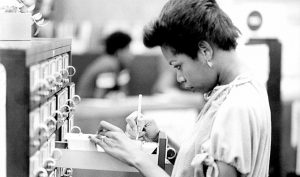Last week I had the opportunity to attend the LACUNY 2017 Institute, a small conference sponsored by the Library Association of the City of New York at LaGuardia Community College. The theme was The Future of Librarianship: Exploring What’s Next for the Academic Librarian. I was drawn to the conference anticipating several lively panel discussions of interest to me: the application of organizational development towards more inclusive environments at work, egalitarian teams for grassroots organizing, and building the post-collection library (i.e. no physical books at all).
What a wonderful professional development opportunity for librarians.
In this post I want to share the themes from Barbara Rockenbach’s rich keynote address, Thinking about IMPACT on Research, Teaching and Learning. Rockenbach currently serves as Interim Associate Director for Collections and Services at Columbia; her talk drew upon broad experience, from computational methods applied to humanities scholarship to undergraduate research and instruction. I especially liked how she connected the themes of space, collections, partnership and context to both current research and real life examples from her home institution.
The library can be a space that puts the user front and center, preparing spaces that are flexible, that facilitate conversations, that are moving from passive to active space in support of student success. The space may be quiet, social or collaborative. For instance, Studio @ Butler is “co-owned and co-programmed by faculty” and provides open labs, instruction in tools like R and Python, and “talk shops” that incorporate both formal presentation and experiential workshop. A great example of David Lankes’ “library as conversation” with the community.
Rockenbach used Lorcan Dempsey ‘s ideas to talk of the future of library collections – valuing less what a library “owns” to the service a library facilitates. We will be thinking less about “our collections, our systems, our buildings” to considering the communities we serve. Thinking less about the life of the library towards thinking about the library in the life of the user.
The library is a partner in the work of scholars. Columbia participated in a collaborative Librarian Liaison Institute pilot with Cornell, ARL, and the University of Toronto. Its much discussed report (here at Temple too!) on the evolving role of liaison librarians had this as one conclusion: librarians need to focus away from the work of librarians to that of scholars, and to develop engagement strategies based on their needs and success factors.
The April 2017 US Library Survey suggests a disconnect between university administration and library leadership, in terms of how the library contributes to the teaching and research mission of the institution.
Library directors are pursuing strategic directions with a decreasing sense of support from their institutions. There is evidence across the survey that library directors feel increasingly less valued by, involved with, and aligned strategically with their supervisors and other senior academic leadership.
Pointing to Columbia’s efforts, Rockenbach says that libraries engaged with strategic planning efforts are less likely to suffer this fate. Libraries need to commit its values as well as its objectives to the larger institutional context. For instance, what does it mean to be a diverse and inclusive library?
The library provides space for learning, but also serves as an alternative to the formal classroom. The idea was captured eloquently by Ta-Nehisi Coates’ in his Between the World and Me :
I wanted to pursue things, to know things, but I could not match the means of knowing that came naturally to me with the expectations of professors. The pursuit of knowing was freedom to me, the right to declare your own curiosities and follow them through all manner of books. I was made for the library, not the classroom.
And, a big thank you to Barbara Rockenbach for allowing me to re-cycle her perspective on the future of academic libraries.


